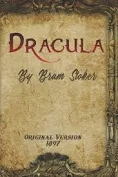The most recent books read for my two U3A book groups are both oddly familiar and oddly unfamiliar.
One was Dracula by Bram Stoker, which is one of those stories every single one of us knows even if we have never opened the book. Even small incidents from the book seem familiar, such as the arrival of the Demeter at Whitby (though how many of us realise that it is based on a real incident involving the arrival at Whitby of a Russian ship called the Dmitri?).
But the novel seemed like it should have been particularly familiar to me because I know I read it myself many years ago, and indeed I remember hating it. And yet the moment I opened the book I was in unfamiliar territory. The names of the characters (or at least most of them) were familiar, but there were other key players in the drama that I would swear I had never encountered before. Did the book I once read really begin with solicitor Jonathan Harker making his way to visit an important client in Transylvannia? Transylvannia, yes, that’s one of the things we know without ever reading the book; but the journey meant nothing to me. And the loneliness of Dracula’s castle, the sense of imprisonment, felt like something I should have remembered.
Then there’s Renfield! Endless films and comedy skits and the like have taught me to see him as the Count’s creepy assistant, but here he is a rather pitiable inmate of an insane asylum drawn to Dracula by a curiously disturbing mixture of desire and dread.
And how did I not know that the novel’s strange hero figure, Van Helsing, had a first name? Indeed, that he was called Abraham, Stoker’s own name. Is there a significance in this? And what a curious character he is, the man of science who turns out to have an encyclopedic knowledge of obscure Balkan folklore, and access to a veritable warehouse stuffed full of sanctified communion wafers. From his knowledge and preparedness, one would think he had already had multiple encounters with vampires, though there is nothing to suggest this. Meanwhile the posse of amateurs who join him in this campaign seem to have far more understanding of, and reliance on, modern science.
These, and other disconnects from what I remember, or from what I was anticipating, made Dracula feel new. But that seems only appropriate. Because despite the emphasis on the past, on superstition and the supernatural, what leapt out for me was that this is very much a novel about the modern. It’s there in the technology, the use of telegrams and typewriters and recordings. It’s there in the attitude towards science, the use of blood transfusions and psychiatry. Above all, it’s there in the characters: Mina, far and away the most interesting character in the book, is what would, a few years later, have been called a New Woman, and very likely a suffragette. For a female character in a late-Victorian novel she is strong-willed, independent, and effective. She contrasts remarkably with the other major female character, who is very much what you would expect of a Victorian heroine, demure, reliant on others (particularly men), a figure to whom things happen rather than someone who makes things happen. Lucy, one suspects, is drawn from the novels Stoker read; Mina, perhaps, is drawn from the actresses that Stoker encountered in his day job.
The second novel is familiar and unfamiliar in a different way: because I know the story, but I have never previously encountered this telling of it.
Hag-Seed by Margaret Atwood is one of a series of books commissioned to update the plays of Shakespeare. The play in question is The Tempest, one of my favourite Shakespeare plays. I well remember seeing the wonderful Globe production with Roger Allam as Prospero, probably the best version of the play that I have seen; and we also saw the most recent RSC production with Simon Russell Beale as Prospero, which felt as if it was overtaken by its own technology though it is perhaps closer to the staging Felix in the novel would prefer. It’s a play open to all sorts of interpretations, some better than others.

Atwood’s version is set in contemporary Canada. Her Prospero, the far-from-happy Felix, is the obsessive creative director of one of those annual small town theatre festivals. But he is so caught up in what we should call the magic of the theatre, planning an extravagant production of The Tempest, that he remains blissfully ignorant of the machinations of his second-in-command, who, with the help of an ambitious local politician, eventually topples Felix from his post. Felix retreats to a backwoods hideaway, where he communes with the ghost of his recently-dead daughter, Miranda. Years pass, and eventually Felix lands a job at the local prison, staging plays with the inmates. When he learns that the two men responsible for his downfall will be visiting the prison, he hatches a plan for revenge by staging his long-delayed production of The Tempest.
The back story and set-up is the weakest part of the novel, but once we get Felix and his inmate/actors planning their production, the story really catches fire. And when the avatars of Alonso and Antonio arrive at the prison they are detached from their entourage and swept into their own private, hallucinatory performance of the play. What we get, therefore, is a triple vision. One the one part there is Shakespeare’s play; alongside this, there is an analysis of the play given while Felix is training and rehearsing his players; and thirdly the events of the novel echo the events of the play. The result is complex and prismatic, and not always successful. As I said, the long introductory section is far and away the weakest part, but once in the prison the structure of the novel really starts to work. But the best bit comes at the end, when Felix leads his actors on a debriefing of their performances. The inmate chosen to play Caliban gives a long, bravura account of what comes after the play closes, when he imagines Caliban exacting a brutal revenge on everyone else in the play.
I’ve only read a handful of things by Atwood, and my response to her work is mixed. Some things have been excellent, some have made no impact on me one way or the other. This turned out to be one of the more memorable works, though I suppose it is not exactly clear whether this is down to Atwood or to Shakespeare.



